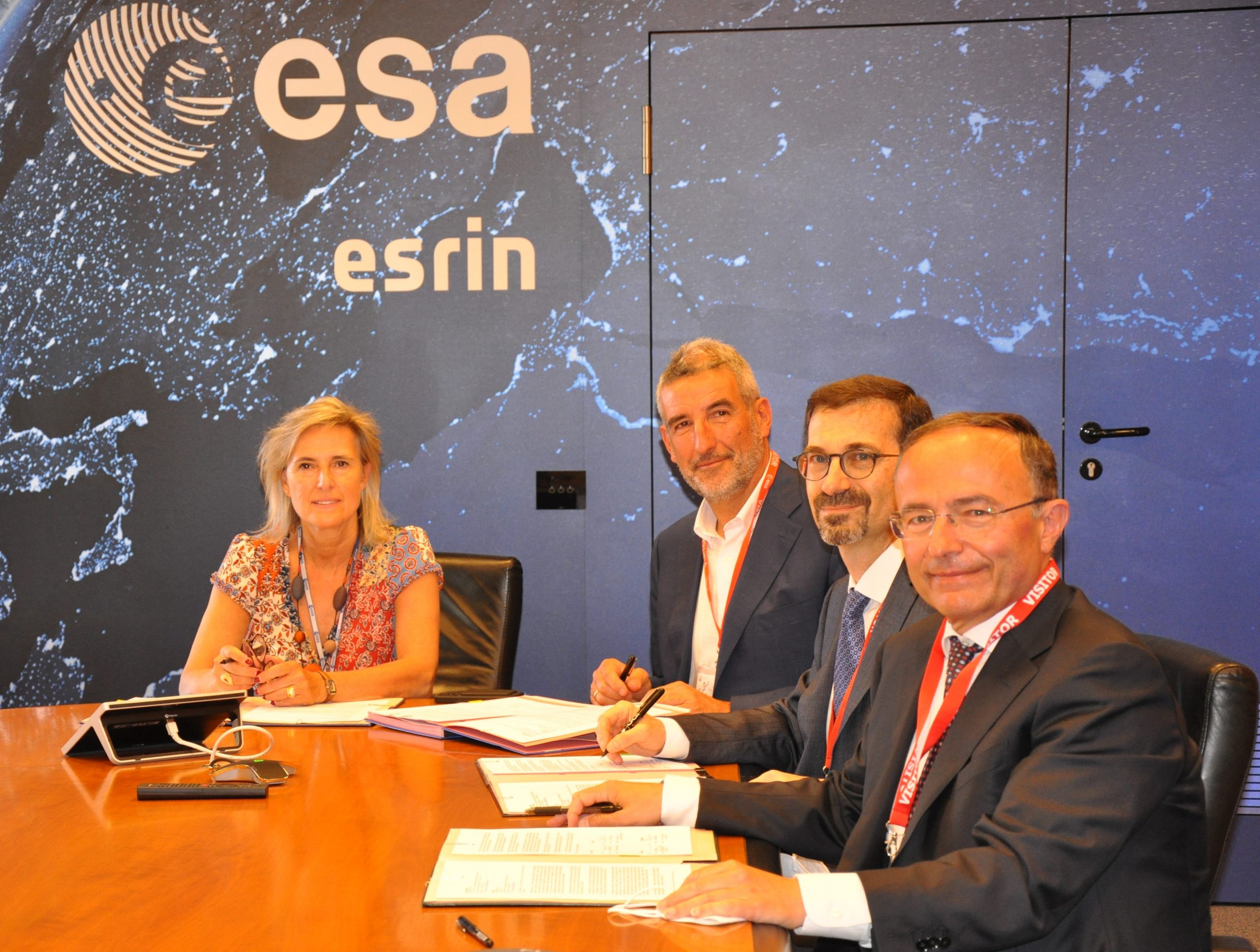Φ-lab@ESRIN extends its AI innovation push through collaboration with Leonardo Labs



The ESA Director of Earth Observation has signed a letter of intent with the Space Technologies Leonardo Lab (represented by Leonardo, Telespazio and e-GEOS) with a view to jointly developing space-based solutions for Earth observation (EO). After exploring areas of common interest, ESA Φ-lab and the Space Technologies Leonardo Lab will work together on projects that seek to boost the impact on the space sector of transformative technologies such as Artificial Intelligence, High-Performance Computing (HPC), quantum computing and Big Data.
The mission of Φ-lab@ESRIN is to accelerate the future of Earth observation through transformational innovation, thereby strengthening Europe’s world-leading competitiveness in the space sector. Partnerships are an essential building block of that mission, and Φ-lab has concluded a number of agreements with organisations, including venture capitalists, large and small companies and research centres, in order to increase the breadth and reach of its activities.
Two of the principal focus areas of innovation at Φ-lab are Artificial Intelligence (AI) and new computing paradigms like quantum, neuromorphic and edge computing, areas which are also central to the remit of a network of research laboratories set up by Italian company Leonardo. These Leonardo Labs include a Space Technologies research centre in Rome, run by Leonardo together with affiliates e-GEOS and Telespazio.
With such a degree of common interest between Φ-lab and the Space Technologies Leonardo Lab, the idea of a collaborative venture seemed like a natural fit. Leonardo Chief Technology and Innovation Officer Franco Ongaro explains: “The Leonardo Group has a consolidated relationship with ESA, further strengthened by the agreement signed with Φ-lab. The agreement with ESA allows us to pool our skills in areas such as AI, Big Data and quantum computing, combined with the computational capabilities of Leonardo’s HPC infrastructure, davinci-1, to increase the application of innovative methodologies in Earth observation and in the wider space context. The agreement is an expression of the vision of the company, which aims to strengthen the research activities carried out through the Leonardo Labs network – the company’s network of laboratories aimed at the digital sphere – and the consolidation of the open innovation activities that both represent determined factors of growth and competitiveness.”
“ESA Φ-lab is committed to pushing the boundaries of Earth Observation and how it is conceived, designed and implemented,” adds Simonetta Cheli, ESA Director of Earth observation. “The ultimate goal is to boost the innovation element of EO and thereby strengthen Europe’s world-leading competitiveness from both a scientific and commercial point of view. When we started interactions with what are now the Leonardo Labs, we immediately recognised synergies and complementarities that could greatly benefit this vision. We’re very pleased to have now reinforced our relationship with these major industry partners on topics of collaboration that are at the core of what we see as the future of EO.”
Details of the collaboration, which will also be able to draw on the wider Leonardo Labs network, are to be fleshed out as the parties continue their discussions. Nevertheless, a number of exciting topics of interest have already emerged. Neuromorphic Nets for example are AI architectures that better mimic the human brain and its neural networks in order to increase information processing efficiency and speed. Frugal Learning and Neural Ordinary Differential Equations are both types of AI model that are aimed at balancing computational performance and resources. All three of these areas potentially feed into the fourth topic, Onboard/Edge AI, which concerns the recent addition of AI processors to satellite payloads and the associated requirement for low-power/high performance computation. Last but certainly not least, Explainable/Trusted AI deals with the need to improve trust in Machine Learning models through predictability, robustness and explainability.
“The themes that we’ve jointly identified represent some of the most interesting development areas for the future of Earth observation,” comments Giuseppe Borghi, the Head of Φ-lab and the main ESA point of contact for the collaboration. “In exploring these transformative innovation areas together, Φ-lab and the Space Technologies Leonardo Lab intend to enhance the positive impact of such innovations on EO use cases. We expect the results of the partnership to then strengthen the growth of European EO, an ecosystem that is already generating world-leading solutions.”
Pierre Philippe Mathieu, the Head of the Φ-lab Explore Office, highlights the significance of the Leonardo Lab’s namesake: “AI is going through a global renaissance, and Leonardo Da Vinci was certainly one of the biggest icons of the Renaissance, bringing together as he did so many diverse fields of art and science with his creativity. This partnership between Leonardo Lab and ESA will strive to bring some of this Renaissance mindset to the inspiring world of AI4EO, gathering cross-disciplinary teams to develop innovative EO solutions which capitalise on the latest developments in AI techniques.”
To know more: ESA Φ-lab, Leonardo, Telespazio, e-GEOS
Share